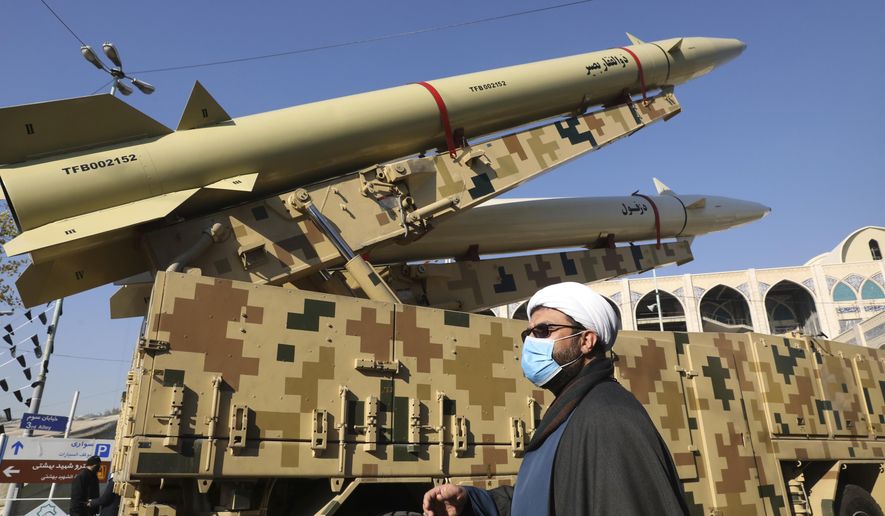A key Iranian dissident group is calling on the Biden administration not to remove Iran’s Islamic Revolutionary Guard Corps (IRGC) from the U.S. Foreign Terrorist Organizations list, amid reports that Tehran is demanding the delisting as a condition for participating in nuclear talks.
Former President Donald Trump drew praise from Iran hawks by adding the IRGC to the terror list in 2019 after pulling the U.S. from the Obama-era Iranian nuclear deal. Removing it now would free up IRGC money flows to terrorist proxies around the Mideast, according to the dissident National Council of Resistance of Iran (NCRI).
A report circulated Thursday by the NCRI said Mr. Trump’s listing of the IRGC — Iran’s main military organization — effectively “handicapped many of the IRGC-related foreign financial transactions.”
While Iran’s government denies allegations that the IRGC or any other Iranian organization supports terrorism, the NCRI report said the IRGC is engaged in “ceaseless terrorist activities to foment mayhem, destruction, and instability across the Middle East.”
“Its financial empire to fund its nefarious activities inside Iran and abroad, make this terror outfit a serious global threat. Stopping this threat without clipping the terrorism wings of the IRGC will not be very effective,” the report added. “If money flows into the IRGC unhindered, it will end up in the hands of Hezbollah, Hamas, Yemeni’s Houthis, Iraqi Shiite militias, and other proxies.”
The report comes amid growing outcry from Republican lawmakers in Washington over the Biden administration’s push to renew the 2015 nuclear deal with Iran, under which the U.S. and other world powers gave Tehran economic sanctions relief in exchange for limits to — and U.N. inspections of — Iranian nuclear activities.
The U.S. re-imposed sanctions on Iran after Mr. Trump pulled Washington from the deal in 2018 on grounds it had not done anything to curtail Iran-backed militancy around the Middle East. The Trump administration then took the step of adding the IRGC to the State Department’s official list of foreign terrorist groups.
Iran has been listed by the U.S. as a state sponsor of terrorism since the early 1980s, when Tehran-backed Hezbollah was accused of bombing a U.S. Marine Barracks in Lebanon.
But the Trump administration’s specific listing of the IRGC was more biting in that it essentially froze the far-reaching Iranian military organization’s access to financial transactions in a wide slate of international banks with ties to the United States.
The circulation of the NCRI report on Thursday, meanwhile, comes against a backdrop of claims by Iran critics that Tehran is demanding to have the IRGC listing dropped before embracing what has been a months-long push by the Biden administration to restore the defunct 2015 nuclear deal known as the Joint Comprehensive Plan of Action (JCPOA).
Israeli Prime Minister Naftali Bennet said recently that Iran is demanding during the nuclear talks in Vienna that the U.S. delist the IRGC as a condition for re-entering the JCPOA.
Mr. Bennett, who opposes the Biden administration’s push to restore the Obama-era deal, used a speech late last month to representatives of U.S. Jewish groups in Jerusalem to emphasize his frustration.
“Iran is demanding to delist The IRGC. Do you understand? They are now asking to let the biggest terror organization on earth off the hook,” the prime minister said, according to Axios, which reported that Mr. Bennet did not say whether the Biden administration had agreed to the demand.
Several Republican lawmakers held a press conference Wednesday on Capitol Hill to project similar concerns about the prospect of a renewed nuclear deal with Iran.
The Iranian regime remains “the world’s largest sponsor — state sponsor of terrorism,” Sen. Joni Ernst of Iowa said at the press conference. “I will remind you that the Iranians were the ones that were manufacturing many of the [improvised explosive devices] that killed and maimed American soldiers in Iraq.”
The report circulated Thursday by the NCRI cited a long history of other terrorist activities that it claims were carried out by Iran.
“Since 1979, the use of institutionalized terrorism as a tool of statecraft has been a pillar of the clerical regime’s survival strategy,” the report said. “From using the Hezbollah in Lebanon to bomb the U.S. Marine Barracks in 1983, the Khobar Towers bombing in Saudi Arabia in 1996, the Jewish Community Center bombing in Argentina in 1994, using drones to target the Saudi-Aramco refinery in 2019, the downing of a Ukrainian Passenger flight in 2020, to name a few, the IRGC’s role in direct or by-proxy state-sponsored terrorism is well documented.”
“A common thread is the role of proxy groups recruited, funded, trained, and dispatched by the IRGC and its Quds Force,” the report said, adding that the IRGC is also at “the heart of the Iranian government’s development of technology in nuclear, ballistic missiles [and] drones.”
• Guy Taylor can be reached at gtaylor@washingtontimes.com.




Please read our comment policy before commenting.